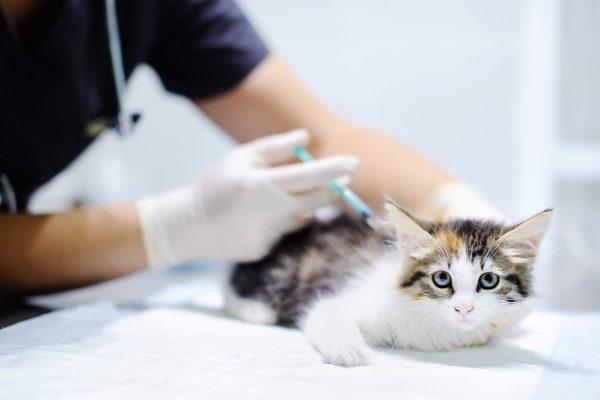-
About
- Leadership & Faculty
- News & Events
-
Academics
- Graduate
- Advanced Clinical Training
- Continuing Education
- Academic Departments
- Academic Offices
- Simulation Experiences
-
Student Life
- Offices
-
Research
-
Hospitals & Clinics
- Emergency Care
- Hospital Services
-
Community Outreach
- Volunteer
The Importance of Vaccines
Precautionary measures provide protection for your pets and you

Vaccinations help to facilitate the prevention of a vast array of illnesses and ailments for pets and their owners. Due to the zoonotic (transmissible from animals to humans) nature of some diseases, administering vaccinations to your pets reduces risks of infections to humans, especially among vulnerable family members, such as the elderly or those with compromised immune systems. As the weather turns warmer and more time is spent outside, here are a few reminders about disease prevention through regular vaccinations to keep pets and owners safe.
Rabies
“Rabies is a fatal disease to most mammals, including dogs, cats and horses,” asserts Mary Labato, V83, a clinical professor at Cummings School and board-certified veterinary internist at Foster Hospital for Small Animals.
Vaccines are mandated by Massachusetts law for dogs and cats and many municipalities offer rabies clinics so it’s easy to get your pet vaccinated. Rabies cases in humans are rare, but treatment is available if exposure is expected. Some wild animals that may carry rabies and are in frequent contact with people and their domesticated pets include skunks, foxes, and bats.
Leptospirosis
Leptospirosis is an endemic (highly common) bacterial infection throughout New England, preventable through an annual vaccine. Massachusetts has a fair number of Leptospirosis cases each year in dogs, which can transmit the disease to people. However, most infections in humans occur through a common source, such as contaminated water and not from dogs. Pets may contract it through direct contact with urine from an infected animal.
“The mortality rate for dogs who contract it ranges from 25 to 50 percent,” Labato shares. “Dogs contracting it generally have a few days of a mild fever and weakened appetite and come into the hospital with elevated kidney or liver values.”
Canine Parvovirus and Feline Panleukopenia (FPV)
Parvovirus, the cause of canine parvovirus and feline panleukopenia (FPV), is “a highly contagious viral disease that causes an acute hemorrhagic diarrheal disease and a possible severe decrease in protective white blood cell count,” Labato contends. It is contracted through the feces of an infected animal. Vaccination is the only method to prevent a dog from contracting parvovirus.
FPV is a highly contagious viral disease. Cats can shed the virus in their urine or stool and infection occurs when susceptible cats come in contact with these secretions. Previously the leading cause of death in cats, FPV is much less common due to the availability and use of highly effective vaccines. The virus does not affect people.
Distemper
Another highly contagious disease, canine distemper is also one of the most preventable through vaccination. Contraction of distemper is most common through direct contact with an infected dog. “We’re seeing more cases of distemper here,” Labato explains, “often from rescue dogs that come in as puppies and have not been vaccinated.”
Lyme (Borreliosis)
Borrelia burgdorferi, the bacteria responsible for Lyme disease, is transmitted by the bite of a tick. It is responsible for Lyme disease in both people and dogs. In dogs the typical bull’s eye rash seen in people is not apparent. Dogs present with fever and joint swelling. It can trigger a severe progressive type of kidney disease in dogs. Lyme disease is treatable with the antibiotic doxycycline. It can be prevented by good tick control (daily tick checks on dogs and cats) and tick preventatives (collars, oral and topical formulations). For dogs there is a vaccination for Lyme disease as well that has been shown to be both safe and effective.
Remember, an animal needs time to build immunity after receiving a vaccine. Protect your pet through preventative measures to help your family lead a healthy and happy life.
Department:
Foster Hospital for Small Animals